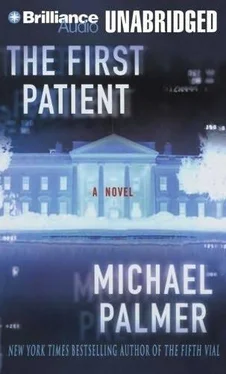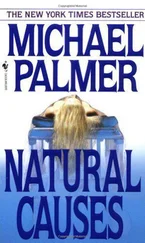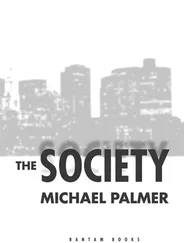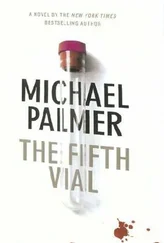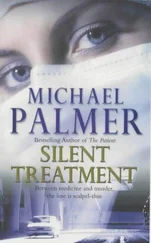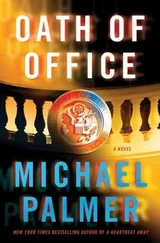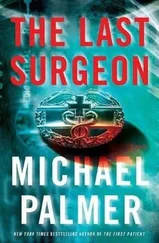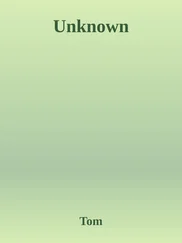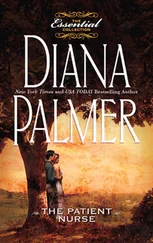One by one, she tested her restraints. No chance. Even the tape over her mouth had been wrapped tightly around her head and then reinforced in front with something firm to keep her from biting through. At the moment only two things were clear-she was absolutely helpless, and she wasn't dead.
She wondered how Griswold could have caught on to her. The answer was elusive. What was clear, though, was that unless Griswold was satisfied that she had told him everything she knew and why she had been prying into his life, in all likelihood she was going to get a lesson as to how much pain she could endure.
Would Griswold risk holding her here in the White House? However unlikely, it had to be unpredictable when someone might happen to need something from this room. There was a light outside the door. That meant her prison wasn't all that isolated.
An hour or so later, her questions were answered. With a soft click, the door opened, flooding the room with light from a concrete corridor outside. Treat Griswold slipped inside, flicked on the single bare overhead bulb, and eased the door closed behind him.
"Time to hit the road, lady," he rasped, his lips beside her ear. "But first, a little something to keep you from getting carsick."
Without another word, he stepped around behind her, buried a needle to the hilt at the base of her neck, and injected the contents of a syringe into her muscle. After just a minute, the room began to spin viciously.
On the way into D.C. from the hospital in Warrenton, Gabe had taken a half an hour detour and driven into Anacostia for a second time, then across the Benning Street Bridge. Once a sought-after middle-class section of the city, according to sources on Google and, of course, Wikipedia, Anacostia began its evolution from 90 percent white to over 90 percent black in the mid-1950s. Even though parts of the area had seen much better days, certain blocks still featured neatly maintained homes and yards and a distinct turn-of-the-twentieth-century charm.
Dr. John Torrence, a black major in the Army and part of the White House medical team, had grown up in Anacostia and still had family there.
"White or black," he told Gabe, "walking around Anacostia after midnight isn't something I'd recommend doing on a regular basis. But if for any reason I absolutely had to, I would. Like most inner cities, there are some gangs and drug crazies, but mostly, there are very good people there."
The evening was moonless and unseasonably cool. On his earlier reconnaissance, Gabe had identified a place to park that was as close as possible to the area beneath the Benning Street Bridge. He arrived at the spot twenty minutes before one. It was a narrow street running alongside the Anacostia Reservation, a broad field that just a few hours ago was alive with picnickers, softball and touch football games, soaring kites and Frisbees. The lighting around the park was far from optimal and may have been at least one of the reasons Ferendelli chose the place to meet.
Ten minutes.
Gabe lowered the window of the Buick. There was almost no one about. Twice he heard voices, and once he saw the shadows of three or four people-boys, he thought-making their way across the field. Up on the bridge itself, there was a steady rumble of traffic.
As his eyes adjusted, he could easily make out the river, a tributary of the Potomac and the centerpiece for what was to be a rejuvenation of this part of the city. Just a mile or so to the south, East Capitol Street crossed the river, its westbound lanes headed into Capitol Hill, the Mall, and, of course, the White House.
Just a mile .
Gabe managed a thin smile at the irony. A meeting was about to take place in these hardscrabble surroundings that could affect the world as much as any that had been held in those staid and hoary buildings. It wouldn't be long now.
For a time, the attack on Blackthorn nagged at him. How could the killer have known where Blackthorn was staying? At the psychologist's urging, Gabe had asked Treat Griswold to have his condo checked over for listening devices. Reportedly, none had been found.
Two minutes.
The field remained deserted. There was no movement that Gabe could discern anywhere underneath the bridge. He wondered what he would do if Ferendelli failed to show. Perhaps he would pay a visit to Lily Sexton and offer to set her broken shoulder without anesthesia should she hold out on him anymore.
It seemed as if Ferendelli had carefully chosen the photograph in the medical office to ensure that Gabe would know with certainty that the meeting was with him. Still, Gabe was regrettably learning not to trust anything or anybody when it came to the president.
Careful to keep the interior light from going on and wondering if he had been unwise not to bring along a blunt weapon of some sort, Gabe locked the Buick, left it, and headed across the field toward the blackness beneath the bridge. Overhead, the whoosh of passing cars grew louder as he approached. Headlights flashed by. From his left, the scent of the river grew stronger.
As he neared the bridge, he suddenly found himself picturing the desert, and Condor at a full gallop, bearing him effortlessly across the parched ground, toward a burnt orange setting sun.
Soon , he thought. Soon it will be over .
The field itself seemed to be in excellent shape and reasonably free of debris, but the underside of the Benning Street Bridge smelled of stale beer, river muck, and urine. Broken glass crunched beneath his boots. Gabe stepped into the dense shadow just under the edge of the bridge. Then he turned toward the field and waited for the man he had succeeded in the White House-the Renaissance man who many felt was dead.
"I have a gun," a soft, cultured voice said from behind him. "Lift your hands where I can see them. Don't turn around. What's your name?"
"Singleton. Dr. Gabe Singleton."
"How do you get up to the residence from the office?"
"The elevator across the hall."
"Could you have been followed?"
"I didn't see anyone, but I didn't take any special evasive precautions, either."
"You should have."
"I'm sorry."
"Walk over there to that support. Keep your hands up."
Gabe did as he was ordered.
"Turn around slowly with your hands up."
Again, Gabe did as he was asked. The gaunt, unshaven man confronting him carried no gun. Instead, he extended his bony hand and gripped Gabe's with surprising force. His hair was unkempt, and at that moment he looked considerably older than fifty-six-the age Gabe had read in his personnel file. What Gabe could discern of his expression was grim. He was jittery and badly in need of a shower. His tension was nearly palpable.
"I can't tell you how relieved I am to find that you are alive, Dr. Ferendelli," he said.
"We are in a crisis of immense proportions, Dr. Singleton. Our president is under attack. His life is in danger every day."
"Then his psychiatric breaks are-"
"If by psychiatric you mean a disease of some sort-a spontaneous malfunction in his brain-his problems are not psychiatric at all."
"But-"
Even through the gloom, Gabe could see the intensity glowing in Ferendelli's eyes.
"President Stoddard is not insane," Ferendelli said. "He's being poisoned, dosed with a psychoactive drug-no, no, make that a number of psychoactive drugs."
"I wondered about that when I witnessed one of his episodes," Gabe said, "so I drew some blood for analysis. But the tubes were stolen from the refrigerator in our office."
"Stolen? Do you know by whom?"
"No. Do you?"
"I have some ideas."
"Dr. Ferendelli-Jim-are you all right right now? I mean are you ill?"
"I have not slept for more than two hours at a time in weeks. I'm in as much danger as the president is. They could kill me just as they could kill him, with… with the push of a button." Ferendelli looked furtively about. "Are you sure you weren't followed?"
Читать дальше
